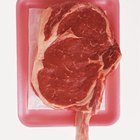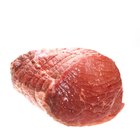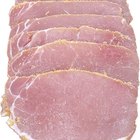
Juicy, tender hamburgers are an American favorite, but they can wreak havoc with your health if they're undercooked. When making hamburgers, avoid overworking the meat, which can toughen them, and don't smash them with the spatula. These tricks will help keep your burgers moist, even when cooked thoroughly to prevent illness.
Why Ground Meat Is Different
Bacteria is everywhere -- on hard surfaces, on our skin and in the air. When a meat packaging company packs whole cuts of meat such as steaks or roasts, any bacteria stays on the surface of the meat. When you cook the meat, this bacteria is easily killed. When whole cuts of meat go through a meat grinder, the bacteria is circulated throughout the ground meat, rather than only on the surface. It's much more difficult to kill this bacteria through cooking because you must thoroughly cook every bit of meat. Additionally, ground beef often includes a variety of cuts that have come from different factories -- often processed in different states or even in different countries. Ground beef may include less desirable cuts that are more likely to come in contact with feces -- increasing the risk of bacterial contamination.
The Risks
If an understanding of how ground beef is made doesn't turn you off to raw, pink hamburgers, understanding the risks probably will. Foodborne illness caused by the E.coli bacteria is the most serious potential risk. This bacteria can cause severe intestinal cramps, bloody diarrhea, seizures, paralysis and even death. About 48 million people become ill with food poisoning each year, according to the Centers for Disease Control and Prevention. Of that number, more than 128,000 are hospitalized and 3,000 die. Children, the elderly, pregnant women and those with compromised immune systems are most at risk. The U.S. Department of Agriculture routinely tests beef for the E.coli bacteria -- and if it is discovered, the USDA issues a recall. However, it's impossible for a consumer to know if a package of ground beef is contaminated. Your best insurance is to handle and cook ground beef properly.
Play It Safe
Eating a rare steak is reasonably safe because the bacteria remains on the outside of the meat, but when it comes to hamburgers, don't settle for one that's pink. When at home, grill your burgers until a meat thermometer inserted in the burger registers 160 degrees Fahrenheit. Slide the thermometer into the side of the beef, rather than through the top to get a more accurate reading. When you're eating out, send the burger back if it's not completely cooked through. Better to be safe than sorry.
Start Fresh
Cooking hamburgers thoroughly is the last step in creating a safe product. The process starts from the minute you buy the meat. Shop for ground beef and other meats at the end of your shopping trip so they stay cold. Keep a collapsible fabric cooler in your car to store meat until you get home. Immediately refrigerate raw ground beef in a refrigerator set at 40 F, or freeze it at 0 F. Use ground beef within two days, according to the USDA. To thaw frozen meat, place it in a pan in the refrigerator overnight or microwave it. When cooking hamburgers, keep surfaces clean. Separate ground beef from other foods and place the burgers on a clean plate after cooking them. Don't reuse a dirty plate that may be contaminated with bacteria.
Related Articles

Can You Cook Meat Gone Bad?

How Long Can Meat Stay out of the ...

How Long After Buying a Beef Roast Is ...

Can You Eat Hamburger Meat That Is ...

How Long Can Beef Brisket Be ...

Should I Cook My Turkey if It Is Smelly?

How Long Can Raw Meat Sit Out?

How to Keep Lunch Meat

How to Cook a Frozen Burger in a Skillet

What Does It Mean When Hamburger Smells ...

Temperature of a Medium-Well Hamburger
What Happens if You Cook Steak a Day ...

How Long Does It Take for Ground Beef ...
Can You Freeze Raw Hamburger, Cook It & ...

How to Grill a Ribeye on a Weber Q

How Do I Tell If Pork Has Turned Bad?

What Does Spoiled Meat Smell Like When ...

Is Frozen Ground Beef Left out for 3 ...

Can I Make a Frozen Burger in a Panini ...

What Are the Dangers of Eating Venison?
References
Writer Bio
Julie Christensen is a food writer, caterer, and mom-chef. She's the creator of MarmaladeMom.org, dedicated to family fun and delicious food, and released a book titled "More Than Pot Roast: Fast, Fresh Slow Cooker Recipes."
Photo Credits
Jupiterimages/liquidlibrary/Getty Images